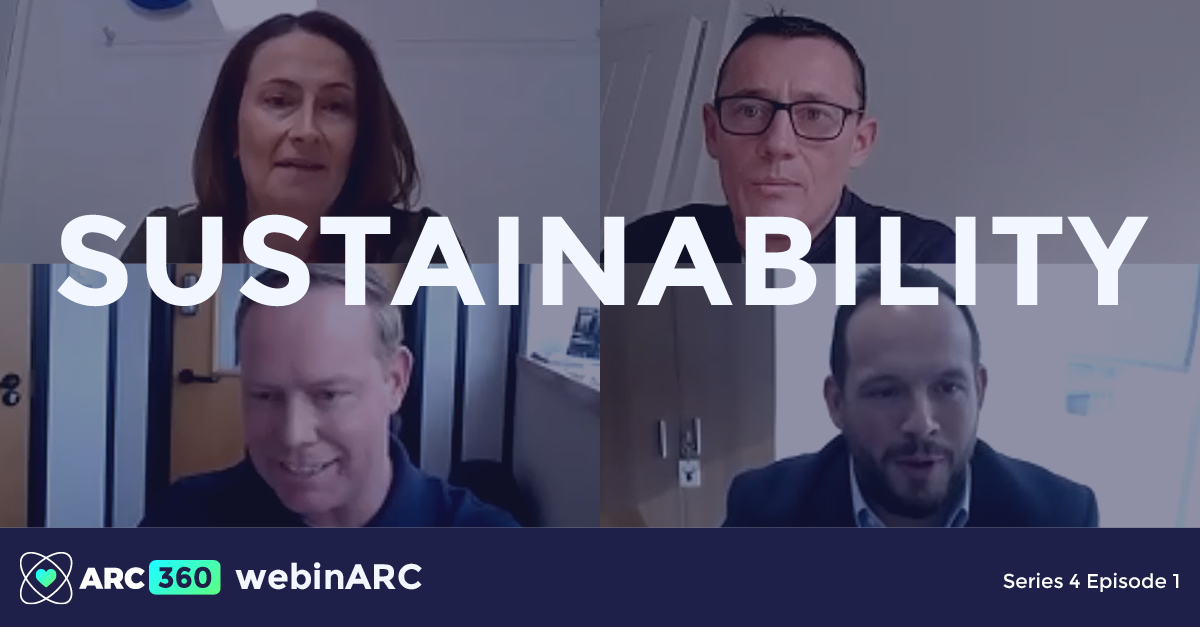Sustainability was the topic of ARC360’s first webinar of 2022, when the opening question was – what does sustainability actually mean to businesses today?
Held in association with I Love Claims, the webinar brought together a diverse panel representing different sectors of the automotive incident repair aftermarket, featuring:
- Charlotte Burnige, company secretary, Coachwork Renovations
- Joe March, head of commercial & network management, The Green Parts Specialists
- Chris Payne, head of networks & engineering – home & motor, LV=
- and Stuart Sandell, assistant vice president – sales, UK & Ireland, Enterprise Holdings
Broad range
While sustainability used to encapsulate a much broader range of business areas – from economic to strategic to human resources – the panel agreed that, increasingly, the word now is used in relation to a company’s environmental policies.
Stuart said, “It can be applied to a lot of different areas, and in some ways economic sustainability has never been more important as we work through the pandemic. But I think sustainability now is heavily linked to the environment and our understanding of our collective impact. The environment has become front and centre now.”
However, while that is certainly true, it is also true that all elements of sustainability impact each other and targets in one area cannot be reached at the expense of others.
Charlotte said, “Every element of sustainability is entwined. We all want to do things that benefit the environment, but we won’t be able to invest in the training, culture and processes if we are not financially sound.”
Commercial
Economic and environmental sustainability are not mutually exclusive though, and the idea that ‘going green’ can actually yield commercial results is gaining momentum.
One area where this is, according to Joe, a ‘no-brainer’, is in the use of green parts. He says that using more green parts in repair is beneficial for bodyshops as they are substantially cheaper than their OEM equivalents and, in many cases, will arrive on site quicker while insurers will benefit from seeing the cost of repairs going down.
However, to make the supply cycle work it needs full market buy-in. In other words, to ensure there are enough recycled parts available at one end insurers need to provide enough vehicles at the other. Joe says that this is not the always the case at present.
He said, “It’s about trust. For us, sustainability is about being commercially astute and working with our partners to help them become commercially astute. We question everything we do and ask if we can do it more efficiently, so often being more sustainable means being more cost-effective.”
Marginal gains
Chris agreed that it is a process of marginal gains. He likened the shift to a sustainable future to turning a tanker around in a canal, but insisted that incremental changes add up.
“Ultimately it’s about achieving net carbon zero. Our global CEO has a very clear vision about that and that gives us a clear idea of what we need to achieve. But there are no easy wins, so we are bringing it down to a granular level. How can we stop driving so much? How can we start using more green parts in repair? How do we achieve a paperless operation?
“There are many marginal gains we can make ourselves, but we’re also working with and investing in our repair network to help them meet our standards.”
The Green Heart Standard – which addresses carbon footprint, electric vehicles, green parts, diversity and equality, mental health, and apprentices – is fundamental to that and LV= can now announce that nearly 50% of its repairers have achieved or are working towards PAS 2060 certification.
“We’re really proud of that,” Chris said.
He added that there is an increasing commercial benefit to this as well, as more and more customers seek businesses that have a proven environmental focus.
Strategy
But while the sustainability challenge may be daunting, it is also an opportunity as there is a chance for gains in almost every area of every business.
For example, on a macro scale, Enterprise has been considering the implications of introducing more electric vehicles into its global mobility solution and what that might mean for emissions and charging infrastructure.
It is also looking at ways of encouraging customers to switch from ICE to EVs when taking its hire cars, which is something that LV= has been trialling at certain sites for the past year.
“Take-up has been low,” Chris said, “but it’s something we’re actively pursuing.”
Meanwhile, on a micro scale, Charlotte spoke about wastage in packaging, revealing that Coachworks Renovations fills up two 1,100-litre containers every single week just with cardboard used in parts delivery.
“That doesn’t even include single-uses plastics,” she said, “so is there a way the industry can reduce packaging without effecting the quality of the part that is delivered?”
People
Ultimately though, strategy only goes so far, and the success or otherwise of sustainable initiatives will be measured by the level of engagement from individuals. No one person can make a telling difference, but the difference of many people working towards the same objective is greater than the sum of its parts.
Stuart said, “Culture eats strategy for breakfast. You can have best strategy in the world but you need the people to execute it.”
He explained how regular company-wide ‘townhall’ meetings with the Enterprise leadership keep colleagues informed and engaged, while communication is also paramount for both Christine and Joe.
Christine said, “Our team knows what the vision is. We’ve been working on our greener project for five years so they know what we’re doing and if you sit down and explain why you’re doing something people are happy to embrace the change.”
Joe agreed: “We have more than 300 employees in a number of different roles, but we think that people working in silos and not understanding how their role makes a difference is a wasted opportunity. We take a proactive approach in making sure our wider teams understand what sustainability is about and how they can help.”
The webinar was sponsored by eBay and supported by ARC360 Corporate Partners BASF, BMS, CAPS, Copart, Emacs, Entegral, Enterprise Rent-A-Car, Innovation Group, Mirka, Nationwide Vehicle Recovery Assistance, S&G Response, and Sherwin Williams as well as Partners asTech, The Green Parts Specialist, Indasa and Prasco.
















